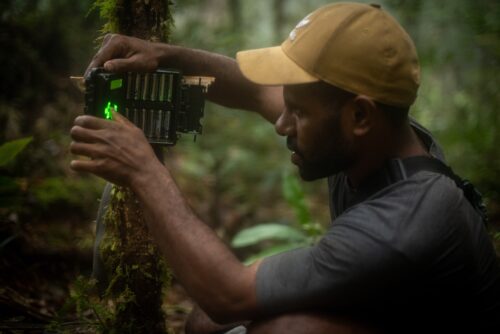Intercultural Understanding

In this unit (to accompany SAPIENS podcast S6E8), students will learn about the importance of intercultural understanding. Culture impacts people’s speech, actions, and thoughts, and students will evaluate how understanding this is the first step to gaining intercultural competence. Students will explore challenges to intercultural understanding and learn how empathy, active listening, and dialogue all play a role.
- Identify the challenges to intercultural communication, such as stereotypes, ethnocentrism, and cultural misunderstandings.
- Distinguish the role of empathy, active listening, and dialogue in bridging the gap between cultural insiders and outsiders.

Are Colors Universal?

Why Navajos Love Their Country Music

When Wartime Plunder Comes to Campus

How Virtual Reality Is Restoring Liberia’s Culture

A Poetics of Liberation: An Imagined Archive

The Hopes and Hazards for AI in Reconstructing Ancient Worlds

Connecting Local Communities to Paleoanthropology in Kenya

Emic/Etic

Emic/Etic

Harvest Song

The Distant Origins of a Stonehenge Stone

Payangko, or Echidna (Zaglossus attenboroughi)

What a Community’s Mourning of an Owl Can Tell Us

Bila Mwili

Huh? The Valuable Role of Interjections

The Hopes and Hazards for AI in Reconstructing Ancient Worlds

Broken Sonnets for the Anthropocene

Connecting Local Communities to Paleoanthropology in Kenya

The First Space Launch for Mauritius

Passing Notes
-
That which occurs in or among two or more cultural groups.
-
A preconceived negative attitude held toward a group.
-
A belief, often negative, held about a group of people based on a particular characteristic.
- Stereotyping is a cognitive association organizational process that involves making generalizations about people or groups based on a personal attribute or characteristic. Many stereotypes are negative, have long histories, and can vary based on context. Discuss how stereotypes form.
- When we encounter people from a culture different from our own, we may experience the anxiety that comes with uncertainty and newness. This type of anxiety is called intercultural communication apprehension and comes from real or imagined cultural differences, such as language, customs, or norms. It is often a fear of not knowing what to do or what to expect from a situation. Discuss intercultural communication apprehension, including what it is and how to manage it.
- Ethnocentrism is the process of evaluating other cultures and peoples through the standards and practices of your own culture. This can lead to the assumption that one culture may be superior to another and confuse “different” with “right.” Discuss the barrier of ethnocentrism and other obstacles to intercultural understanding.
- Active listening is a tool that can facilitate communication between people from different cultures, as it can help expel fears, negate misinterpretation, and create empathy. Discuss other tools that can help intercultural understanding.
-
Conklin, Alice, and Mireille Rosello. 2000. “Declining the Stereotype: Ethnicity and Representation in French Cultures.” Journal of Modern History 72 (2): 543–545.
-
Tentori, Tullio. 1996. “Brainstorming on Intercultural Communication.” Current Anthropology 37 (5): 868.
- What are two ways we can become Other-oriented in terms of intercultural communication?
- What is a worldview? Give an example of your worldview.
- Describe two ways you can ethically adapt your communication style when immersed in a different one.
- What are two barriers to effective intercultural communication?
- What biases can exist when interacting with someone from a culture different from your own? How can tools like active listening, dialogue, and empathy help overcome these?
- Many people in the United States use and prefer a direct communication style, and verbal communication is emphasized over nonverbal. This is not the case in all cultures; in some, directness can be considered rude or aggressive. Create a scripted scenario in which a person interacts with someone from a culture that does not use or prefer direct communication. Discuss the disparity and how the situation may be worked out.
- Create a toolbox for an anthropologist to help with intercultural communication. For each tool, include a description and how the tool facilitates understanding.
-
Article: Stephen M. Croucher’s “Intercultural Communication: Where We’ve Been, Where We’re Going, Issues We Face”
-
Book: Stephen Bochner’s Cultures in Contact: Studies in Cross-Cultural Interaction
-
Video: Pellegrino Riccardi’s Tedx Talk “Cross Cultural Communication”
Aimee L. Richards, Freedom Learning Group
Using Ethnographic Methods
